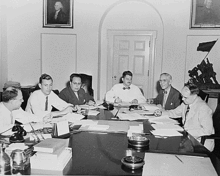Leon Keyserling
Leon Hirsch Keyserling (born January 22, 1908 in Beaufort , South Carolina , † August 9, 1987 in Washington, DC ) was an American economist who was chairman of the Council of Economic Advisers between 1950 and 1953 .
Life
After attending school, Keyserling studied economics at Columbia University and graduated in 1928 with a Bachelor of Arts (BA Economics). He then completed a postgraduate degree in law at the Law School of Harvard University in 1931 with a doctorate in law (LL.D.) and then worked at Columbia University. He was also a paralegal on the advisory staff of Robert F. Wagner , a longtime Democratic US Senator from New York State .
When the Council of Economic Advisers , an advisory body to the President of the United States , was created under the Employment Act 1946 , Keyserling, who was a member of the Democratic Party , became its first vice-chair and held that position until 1950. He was subsequently from 1950 to 1953 as the successor to Edwin Griswold Nourse, chairman of this advisory body.
After completing this position, Keyserling worked for the Conference on Economic Progress between 1954 and 1987.
Publications
Keyserling published his economic policy ideas in numerous specialist books, which dealt in particular with employment and prosperity policy , but also with the New Deal of the 1930s . His most famous books include:
- Redirecting Education (co-author Rexford Tugwell , 1934)
- Toward Full Employment and Full Production (1954)
- Consumption-Key to Full Prosperity (1957)
- The Federal Budget and the General Welfare (1959)
- The Peace by Investment Corporation (co-author Benjamin Javitts , 1962)
- Taxes and the Public Interest (1963)
- Progress or Poverty (1964)
- The Move Toward Railroad Mergers (1965)
- A Freedom Budget for All Americans (1966)
- The Scarcity School of Economics (1973)
- Liberal and Conservative National Economic Policies and Their Consequences, 1919–79 (1979)
- The Current Significance of the New Deal (1984)
Web links and sources
- Literature by and about Leon Keyserling in the catalog of the German National Library
- Leon Keyserling in the nndb (English)
| personal data | |
|---|---|
| SURNAME | Keyserling, Leon |
| ALTERNATIVE NAMES | Keyserling, Leon Hirsch (full name) |
| BRIEF DESCRIPTION | American economist |
| DATE OF BIRTH | January 22, 1908 |
| PLACE OF BIRTH | Beaufort , South Carolina |
| DATE OF DEATH | August 9, 1987 |
| Place of death | Washington, DC |

